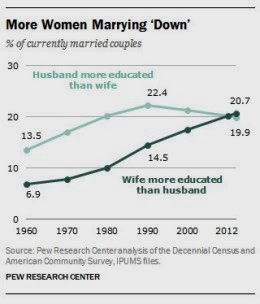[The trend is
not necessarily due to the fact that women are smarter than men. More women than
men have been graduating from college at all levels—bachelors, masters
and doctoral—for several years, so it was simply a matter of time
until the marriage pool
reflected that.]
More women are
"marrying down," at least academically.
For the
first time in 50 years, the educational balance among married couples has
tipped towards women. Wives are more likely to be the better educated partner
than the other way around. The trend is particularly sharp among newlyweds; in
2012 almost 40% of college educated women were married to a guy without a
degree.
This is a big
reversal from the 30 year trend between 1960 and 1990, when it was the men who
were marrying down, educationally speaking. The difference is not yet huge; Pew
researchers, using data from the American Community Survey and the Decennial
Census, found that in 2012, 21% of wives had advanced further academically than
their spouses, while 20% of husbands were the more educated ones. But it
appears to be growing; counting just newlyweds (those married in the 12 months
before the survey), more than a quarter of the women had chosen a partner with
less education, while 15% of men did the same.
The trend is not
necessarily due to the fact that women are smarter than men. More women than
men have been graduating from college at all levels—bachelors, masters
and doctoral—for several years, so it was simply a matter of time
until the marriage pool
reflected that.
While most
married couples still have similar education levels, that percentage too is
dropping. In 1960, 80% of couples were equally educated. Five decades later
that figure has fallen to 60%. This is despite the increasing tendency of college graduates
to marry each other.
“Adults with high
school or less education are much less likely to marry,” writes Pew
researcher Wendy Wang, who authored the new report. “The marriage rate among
this group plummeted—from 72% in 1960 to 46% in 2012.” Three quarters of
American wives in 1960 were married to guys who, like them, had a high school
education or less. Sometime during the 80s, the share of married folks who both
didn’t go to college slipped below 50%. And so it has continued, so that in
2012, almost as many marriages are made up of two spouses with college degrees
(22.4%) as two spouses who only went to high school (24.2%). About 12% of
marriages are made up of couples with some college education.
Many experts have
weighed in on why why marriage has fallen out of favor among the less educated.
One of the reasons seems to be that marriage, which used to be like the
draft—more or less mandatory—is now more like voting: people aren’t quite sure
what’s in it for them. With advances in birth control and women’s earning power, the need
for a permanent legal union seems less obvious.
The high divorce
rate in the 80s may also have rattled some who grew up in that era. Other
researchers, notably Andy Cherlin, have
suggested that because marriage is still popular among the better educated—and weddings are more
lavish than ever—it
has taken on the qualities of a status symbol or a merit badge that you earn as
you get your life/career/finances in order.
It’s a trend that
worries some sociologists, who note that the bearing of children has not slowed
at the same pace as weddings have. More than 40% of all children are now born
to single mothers. Married people are much less likely to live in poverty
than unmarried people, and the children of families with two parents tend to
fare better across a series of measures than those of single parent families.
Read more: Are Single Moms
Better Off Single?
What has not yet
been conclusively proved is which is the the predicating factor, the lack of
money or the lack of a wedding ring. It may be that people with less money are
less likely to get married. And government programs that encourage marriage
have not yet yielded overwhelming improvements in the poverty statistics.
Sociologists have
also suggested that the tendency of college graduates to marry one another has exacerbated income inequality, as two high
earners, male and female, form a home, rather than two high earners, both male,
providing for two households. If women start to marry less educated and lower
earning males in bigger numbers, it’s possible that may be partially reversed.
This however, would require a serious rethinking of expectations on the part of
both genders.
@ Time
MONEY WOES ARE SEX DRIVE
On the eve of
Valentine's Day, a new study explains why you may not have that loving feeling
Looking
forward to the sexiest holiday of the year Well, keep your pants on. Your
romantic interest might not have lovemaking on the mind. In fact,
odds are that he or she doesn’t, if the results of a recent poll are to be
believed.
The survey, commissioned by the financial-data
platform Yodlee, finds that 62% of American adults think more about money than
they do about sex. And it gets worse: more than a quarter (27%) of adults in
romantic relationships said that money concerns affect how often they want to
get busy with their partners.
Men think more about sex than women do, the poll found. But men
are just as likely to have their sex drives affected by money woes as women
are: 27% of men in relationships reported that money affected their libidos
compared with 28% of women.
The picture looks bleak no matter what part of the country you
live in, but those of you who actually want to have sex might consider moving
to the West Coast, as your odds of finding like-minded individuals are slightly higher.
@ Time


